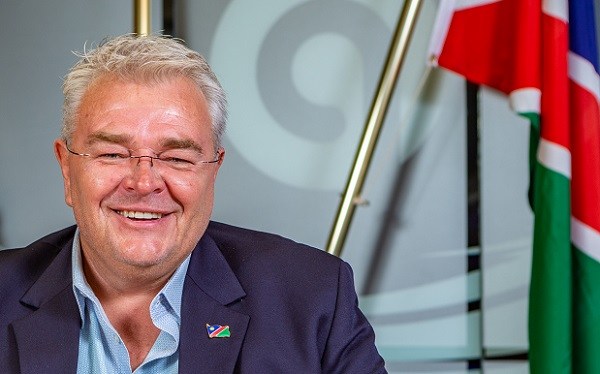
100% growth in only five years – Paratus flexes its telecomms infrastructure muscles

Chairman of Paratus Group, Barney Harmse’s ambitions for the telecommunications company he co-founded almost twenty years ago, knows no bounds. It is the company’s intention to double the group’s revenue over the next five years, a target he is confident they will exceed.
A calculating eye scans columns and rows of figures on a printout Harmse is rather reluctant to let go. It is a concise summary of the group’s results for the financial year ended 30 June 2022. These figures will not be part of Paratus Namibia Holding’s Annual Financial Statements due for release in late September.
Paratus Group is not a listed company, said Harmse, defending the tenacity with which he holds onto his precious printout, implying that there is no legal requirement for him to share the consolidated group performance to any person other than the members of his board, and the shareholders.
With a 20/21 N$1.1 billion group revenue, and a guided target of N$1.4 billion for the 21/22 financial year, the 30% increase provides a credible benchmark that the N$2 billion mark by 2027 is realistic. But in the same breath, he lets slip that he, his board and their financial and legal advisors are regularly searching for extra capital funding for major infrastructure rollouts.
Paratus Group is active in 37 African countries, but more than half of the current revenue originates in only two markets, Namibia and Angola. His spreadsheet shows that Paratus Namibia contributed 28.3% of the group’s revenue, while the remaining two-thirds come from international operations. Harmse sees this as an opportunity, one that will pave the way for more growth in markets like the DRC, Zambia, Mozambique and Botswana. And never one to wait placidly for new opportunities, Harmse said they are already talking to small, agile telecommunications operators in central and West Africa.
What Paratus has accomplished through the Namibian subsidiary, serves in a large measure as the yardstick for what is possible in other territories. Listing the target territories, Harmse acknowledges that there must also be a strategy for products and services and that these may not necessarily be the same for all jurisdictions where they intend to establish future operations.
A pivotal aspect of future revenue is located in the potential of Data Centres. After the successful launch of the group’s fourth data centre outside Windhoek and supported by the performance of data centres in Zambia and Angola, Harmse argues that there is room for several, high-capacity data centres in places such as the DRC. But he also sees this aspect of growth successfully deployed in West Africa, and in other countries where they are already active.
Running hand in hand with his envisioned array of data centres, is other undersea data cables, in partnership with hyperscalers, this time landing at two more places along the western African coastline, most probably in Angola, but other countries like Brazzaville Congo and Gabon are not excluded.
Pivot #3 in the revenue strategy is Fintech, which Harmse insists calling Techfin. “You first have to have the technology infrastructure before you can do the financial side,” he said with a smirk, pointing out that digital technology is helping retailers and other vendors to penetrate the informal financial markets in a diverse range of southern African countries.
For the more mature markets, Harmse sees residential connectivity as an important cog in the revenue drivetrain. “Focusing on consumers in private households will only generate a lesser percentage of our revenue target but in markets like Namibia, Botswana, Zambia and Angola, this service may still prove to be a valuable contributor.
Once a sufficiently large pool of consumers is connected to the internet with reliable broadband links, it opens the door for a host of value-adding services that can be nursed through the new infrastructure, but, said Harmse, this may be outside the five-year horizon on which their current planning is based.
The detail of Paratus Groups’ five-year strategy is not lacking, it is actually astonishing, clearly not the work of a single individual but rather that of a host of clever shareholders, technical experts and advisors.
“Our staff complement currently is well over 560 people and that might increase over the next year,” he said. “It is not our intention to establish new start-ups in every market that we enter, but rather grow through mergers and acquisitions. The revenue benchmark we’re looking for is over $200,000 per employee per annum. This gives us a good indication of where we must focus our investments,” he continued.
“Our management cadre will come mostly from our own existing senior staff. They have been selected carefully and operate in a specific mindset which has proven valuable to us. I consider myself the glue of the team and it is my responsibility to make sure that each and every member of our senior management teams in every market, operates according to our Paratus ethos. The dedication of our existing top structure and management is what will take us from N$1 billion to N$2 billion in only five years,” stated Harmse.










































